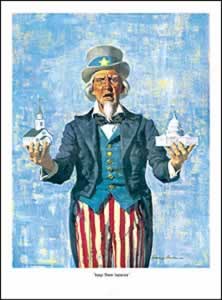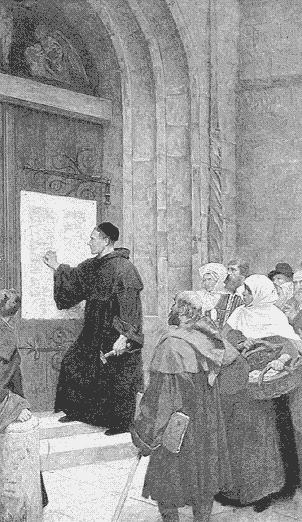
by Bob Boston
On Sunday I gave a talk here in Washington, D.C., to commemorate the 50th anniversary of John F. Kennedy's famous speech in Houston endorsing church-state separation.Kennedy used his Sept. 12, 1960, address to dispel fears that as president, he would elevate Roman Catholic dogma over the national interest. In eloquent language, he told an audience of Protestant clergy that he supported religious liberty and endorsed "absolute" separation of church and state.
I wasn't the only one giving a speech about Kennedy's famous talk. Two days before my event sponsored by the Center for Inquiry, Michael W. McConnell, a law professor and former federal judge, lectured at the University of Notre Dame on the same topic.
I celebrated Kennedy's speech; McConnell bashed it.
McConnell called the speech "entirely and surprisingly negative and defensive." He went on to criticize Kennedy for saying, "I believe in an America where the separation of church and state is absolute."
According to McConnell, "Everyone is for separation of church and state, but when you add the term `absolute separation,' it adds a degree of hostility."
I have to wonder what speech McConnell was talking about. "Entirely and surprisingly negative and defensive"? That's not Kennedy's talk. Kennedy's speech is a powerful reaffirmation of religious freedom and its corollary, the separation of church and state. His rhetoric was soaring and inspiring. (Don't take my word for it. Read it yourself.)
Moreover, the speech worked. A negative and defensive diatribe wouldn't have put Kennedy in the White House. Veteran journalist David Broder, who was actually in the room when Kennedy gave the speech, recently called it "one of the best political speeches I ever heard...."
Kennedy's allies knew he had hit a home run that day. As he watched the speech, Speaker of the House Sam Rayburn enthused, "By God, look at him! And listen to him! He's eating them blood raw. This young fellow will be a great president!"
I'd also like to point out to McConnell that everyone does not support church-state separation, as he claims. There are lots of TV preachers, prelates and pundits who make a nice living portraying that concept as a myth.
In fact, I'd argue that McConnell isn't exactly a huge fan of church-state separation himself. He has argued against that concept several times before the U.S. Supreme Court and worked to undermine the concept during his (thankfully concluded) tenure on the federal bench.
And let's consider Rick Santorum, the former U.S. senator from Pennsylvania. On Sept. 9, Santorum also gave a speech critical of JFK. It's a pathetic mishmash of bad history and character assassination.
According to Santorum, "The idea of strict or absolute separation of church and state is not and never was the American model. It was a model used in countries like France and until recently Turkey, but it found little support in America until it was introduced into the public discourse by Justice Hugo Black in the case of Everson v. The Board of Education in 1947."
Black, according to Santorum, was motivated by this hatred of all things Catholic and by the fact that as a young man in Alabama, he had briefly joined the KKK as a way to advance his political career.
Of course, Santorum didn't bother to mention that it wasn't Black or Kennedy who first introduced this idea of strict church-state separation. The concept goes back a bit more. It can be traced to James Madison, the Father of the Constitution, who in 1819 reflected how the "total separation of the church from the state" had led to a flowering of religious liberty in Virginia. Or to Thomas Jefferson, who said the American people through the First Amendment had built a "wall of separation between church and state."
Let me bottom line this for you: There are people in this country who are mad because they are unable run your life according to their narrow religious beliefs. Some of these people populate Religious Right groups, while others roam the halls of academia, government or think tanks with fancy names.
They sincerely believe their religion is correct. They may even believe it is the fount of all morality and decency. They have the right to believe that.
What they don't have the right to do is compel anyone else to believe it - or base public policy on their theology. It infuriates them that the First Amendment, with its high and firm church-state wall, prevents them from using the power of government as an engine to impose religion.
The good news is that 50 years from now, Kennedy's moving speech will still be remembered, and theirs will not.
Why will that happen? The answer is simple: These guys are no Jack Kennedy. Talk To Action

















0 comments:
Post a Comment